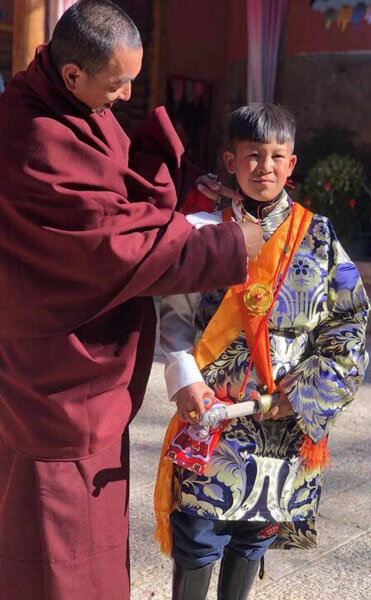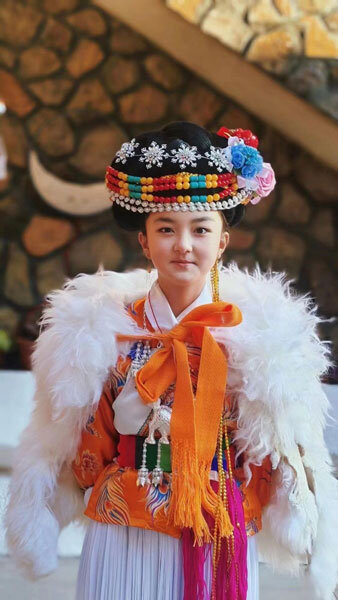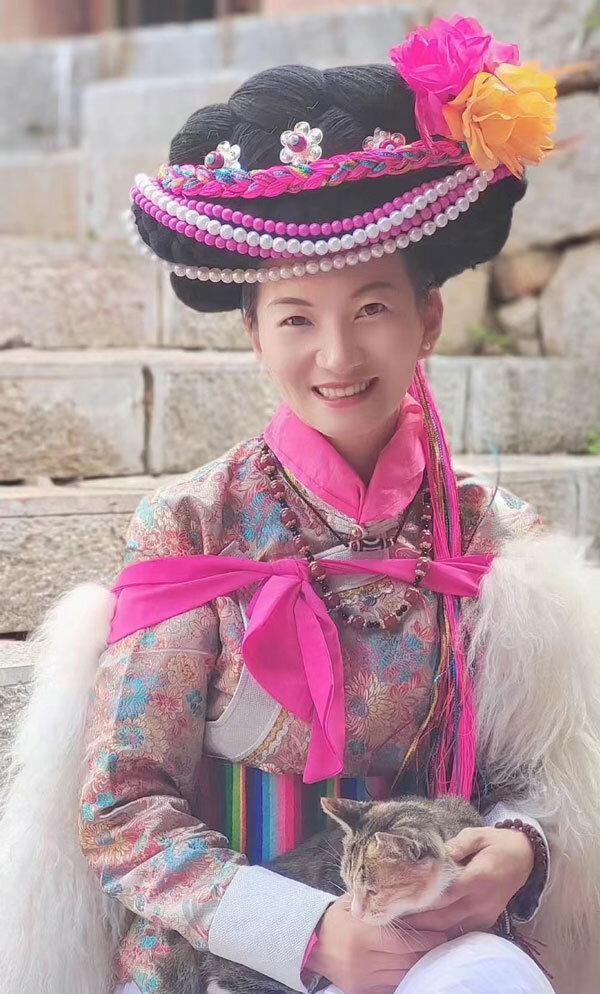Since time immemorial human beings have been exploring the questions, "Who are we? Where did we come from? Where are we going?" The Mosuo people who live by the Lugu Lake are no exception. They have also been looking for the Sibuanawa (the place of origin of the Mosuo people) in the Daba Sutra.*1 During this field study, I, as the author, asked numerous elderly Mosuo people, "what do you think of life and death?" They often responded, "Life and death are naturally present in this world together. Life comes into this world like a dream, without bringing anything with it. Death does not take anything away from this world either, but simply leaves behind legends. However, to ensure that the legends are remembered entails a sutra chant three meals a day before Ranbala, the kitchen deity. Otherwise, the legends will simply disappear after people's death, like a whiff of smoke."*2 If you want life to be meaningful, you ought to have a continuation of life which means the recognition of life and the inheritance of culture. Therefore, the Mosuo people carry out traditional cultural education directly, by means of various ceremonies. The "Coming-of-age ceremony" is the most important ceremony in one's childhood, and also the most solemn and meaningful one in the Mosuo people's life.*3
1 Continuation of life
The Mosuo people's understanding of life is not only about the body, but also about the soul. Only when the "body and soul" are stably integrated can a person's life be called "human." Children under 13 years old are required to wear amulets when traveling.*4 If they travel to places far away from home, the elders must shout loudly on their return journey to call back the souls of the children in case they become separated from their bodies.*5 By the age of 13, a "coming-of-age ceremony" will be held for each Mosuo child, when all relatives and friends come together to express their congratulations.*6 They sing and dance by the campfire, sharing this happy moment together. The author regards this as a continuation of life. Why? Because in the custom of the Mosuo people, if a child should happen to die young, under the age of 13 , they will not hold a funeral for him or her, let alone mention it again. There won't be any stories about this life talked about by the campfire.*7 The coming-of-age ceremony at the age of 13 represents a continuation of life, indicating that the child is about to assume the missions and responsibilities of a human being.*8
It is considered a bad thing for Mosuo villages to not hold any coming-of-age ceremonies for children during the Spring Festival. They believe it is bad luck to miss ceremonies during this period. Therefore, every year when a new baby is born, the whole village will be happy and delighted. Life is very important to the Mosuo people. The joy of life goes far beyond kinship. Although there are also traditions of coming-of-age ceremonies in numerous ethnic cultures, it is rare for people like the Mosuo to treat the coming-of-age ceremony as simply a family event. It is treated as an important event for the entire village, and a very important day for a person. With the development of the times, the Mosuo people have gained a more profound understanding of the meaning of life.
The interviewee Ah stated:*9
Nowadays, young Mosuo people enjoy the trend toward the hustle and bustle of modern weddings. Some people get divorced just a few days after their wedding. A few days later, they then ask people to go to their second wedding. How absurd! The coming-of-age ceremony is different. A person can only celebrate his/her 13 years once in a lifetime. It is unique. Therefore, the Mosuo people's coming-of-age ceremony should be passed down from generation to generation and it should be held with joy and seriousness.*10
People often regard their wedding as a big event in life. The big event in life for Mosuo people is the coming-of-age ceremony. As the passing of time can never be reversed, this ceremony looks particularly unique and special.
2 Mosuo People's coming-of-age ceremony
There are a number of myths about why the Mosuo people hold the coming-of-age ceremony, among which the most widely spread one is the "people-dog longevity exchange." It goes as follows:
The legend relates that when the universe just started to clear from the initial chaos, none of the livings in the world had limits to their length of their lives. The Heavenly God Abadou decided to give all creatures a certain lifespan in order to change this chaotic situation. On the day when the Heavenly God Abadou gave creatures their lifespan, after he had done it for all the plants, it was already midnight when it was the animals' turn. A lot of animals had already fallen asleep. When the God shouted, "one thousand years old," the red-crowned crane answered. Then he shouted, "one hundred years old," the yellow duck answered. At "Sixty years old," the dog answered. When it came to "25 years old," the cow answered. At "Thirteen years old," the ancestor of the Mosuo people answered in his sleep. Thus, people were allocated a lifespan of 13 years. After receiving their lifespans, the ancestor of the Mosuo and the dog went home together. However, the ancestor of the Mosuo was disheartened and felt that a lifespan of 13 years old was too short, and it would be hard for him to report the result to his people. Then they came to a river halfway to their home. The ancestor was able to easily cross the river, but the dog could not. So the man and the dog made a deal. The man would carry the dog across the river, but the dog had to exchange its lifespan with that of the man. The dog agreed. In addition, the ancestor of the Mosuo also promised infinite gratitude to dogs and that future generations would forever appreciate what the dog had done and meticulously raise its offspring. So there is the story of "people-dog longevity exchange." For this reason, the Mosuo people hold a coming-of-age ceremony at the age of 13 to express gratitude to the dog and to commemorate the continuation of life. The Mosuo people prohibit the eating of dog meat and treat dogs with great kindness. On the eve of every Chinese New Year, dogs must be fed with delicious food before people can start eating the New-Year's-Eve dinner.*11
Today, this story is deeply embedded in the heart of every Mosuo person, because after the age of 13, they do not have to worry about their short lifespan, they are about to embrace a new beginning of life instead.
The rite of coming-of-age ceremony is rather complicated. Usually, during the preparation period, the host of the family will dress up the child with brand new underwear and clothes. Auspicious dates will be selected for people to make and buy clothes. The child cannot put them on until the first day of Chinese New Year. In addition to clothes, lard, cured ribs, wine, rice-based food will also be prepared for the occasion when people pay New Year's calls to greet the elders of the family. On an evening during the Chinese New Year, when the sun sets and the moon rises, they sing and dance by the campfire.*12 Everyone gives his/her best wishes to the child in whose name the coming-of-age ceremony is being held.

The coming-of-age ceremony has been considered to be the most solemn ceremony at all times throughout history. The Mosuo people did not give it up even when everyone was poor. According to the interviewee Ge:*13
When I was a child, people were poverty-stricken throughout that period. A lot of people did not have enough money to buy clothes or jewelry for the coming-of-age ceremony. However, my mother saw that it was about to be my coming-of-age ceremony. She traded one of our cows for some clothing fabric and sewed my first gown.*14
Nowadays, with the development of the times and the increasing abundance of material life, what changes have taken place in the coming-of-age ceremony of the Mosuo people? According to the author's research, the material conditions for the Mosuo's coming-of-age ceremony are getting better and better, and there are a great variety of celebration activities. According to the description of the interviewee La:*15
We are going to hold an coming-of-age ceremony for my daughter this year. We have deliberately prepared clothes and lard for her, well in advance of the occasion. There are two sets of Mosuo festival dresses for her, as well as gold and silver jewelry. In addition to the Mosuo dresses, we have also prepared three sets of casual clothes. Our relatives will also prepare a lot of gifts for her, most of which are clothes and jewelry. In the year of the ceremony, there will be more clothes than she wants to wear.*16
From the scarcity of a single garment in the impoverished era to the endless supply of clothing today, it is obvious that over time there has been a gradual improvement in the material life of the Mosuo. Ceremonies are more about an understanding of culture, an insight to life than just an expression in the material way. If you ask many young Mosuo, "How did you feel about the coming-of-age ceremony?", some of them say they couldn't sleep that night; some say they realized they truly were a Mosuo, and some say they realized they were no longer children. People are intensely aware of the excitement, identity, and growth associated with the coming-of-age ceremony. It is the most indispensable part of the Mosuo people's life.
When I was 13 years old, my family carefully prepared the attire for my coming-of-age ceremony. At that time, the grandmother with the best skills in the village was invited to sew the attire, one stitch after another. The material selection and design of the clothes were full of the Mosuo symbolism, and from that time on, I have gained an initial understanding of my own ethnic culture. Although I didn't quite understand the significance of these ceremonies at the time, my understanding has deepened with the growth of my social experience. Therefore, I believe that the coming-of-age ceremony is very important in a person's life, be it the 13 year old of the Mosuo people or the 18 year old of other ethnic groups, all with their own value in existence. Coming-of-age ceremonies are often where a person acquires the initial recognition and affirmation of themselves, as well as a respect for life.
In 2023, the Mosuo coming-of-age ceremony was listed as a provincial-level "intangible cultural heritage" in Lijiang City.*17 It can be seen thereby that the Mosuo coming-of-age ceremony is a shining star in human civilization. The coming-of-age ceremony has continued for the Mosuo people for so many generations, witnessing the growth of Mosuo children, one after another. It is a blessing, a hope, and the best way to inherit the traditional culture of the Mosuo people.

- *1: Sibu Anawa: A name of a place. Mosuo people believe that this place is the origin of Mosuo people. When a person dies, the soul is sent to the homeland to reunite with the ancestors, instead of letting the soul wander away.
- *2: The legend here refers to the life of the Mosuo people. Although people have passed away, the names of the deceased can be heard in the daily rituals. Parents will tell the stories about these deceased people to the younger generations on a daily basis.
- *3: Compiled from the fieldwork log on August 15, 2020.
- *4: The age of 13 here refers to the nominal age. According to one's Chinese zodiac sign, the coming-of-age ceremony is held during the Spring Festival; when one completes a full 12-year round and begins a new cycle of their Chinese zodiac.
- *5: The purpose of calling out for the souls is to keep them from being frightened and wandering away.
- *6: Coming-of-age ceremony: Usually called Cheng Ding Ceremony.
- *7: Compiled from the fieldwork log on December 29, 2021.
- *8: In the Mosuo culture, a "person" is someone who is flesh and blood, virtuous, wise, loving, filial, trustworthy, and proactive. They are also ordinary individuals who lead simple lives. In layman's terms, a "person" is someone who does not harm society or infringe upon the interests of others.
- *9: Ah mou: female, Mosuo, 52 years old.
- *10: Compiled from the fieldwork log on January 5, 2022.
- *11: Compiled from the fieldwork log on January 18, 2022.
- *12: The specific time was arranged by the village, and all children who held the coming-of-age ceremony took turns to come.
- *13: Ge Mou: male, Mosuo, 83 years old.
- *14: Compiled in the fieldwork log on July 18, 2022.
- *15: La mou: female, Mosuo, 40 years old.
- *16: Compiled from the fieldwork log on January 20, 2022.
- *17: Source: Lijiang Intangible Cultural Heritage Protection Center.

Mosuo native, teacher with Lijiang College of Culture and Tourism, master in religion from Southwest Minzu University. Engaged in a number of social field research projects, such as the national language protection project Mosuo language rescue and protection, the project of National Social Science Fund " Cultural History of Disaster of Yunnan Indigenous Minority Groups", etc. Since 2011, following up with studies on Mosuo matrilineal culture (marriage, religion, etc.).Also engaged in related cultural researches and visiting scholars' projects.
- Learning from Japan's Custom in Remote Islands: the Role of Social Parents at the Time of Childbirth
- [Perspectives of Traditional Culture of the Matrilineal Mosuo of Lugu Lake] Part 1: Children Born from Sese (Visitor) Marriages Know Who Their Mothers and Fathers Are
- [Perspectives of Traditional Culture of the Matrilineal Mosuo of Lugu Lake] Part 2: First-Sight-Of-Sun Gifts for Mosuo Babies
- [Perspectives of Traditional Culture of the Matrilineal Mosuo of Lugu Lake] Part 9: Chinese New Year
- [Perspectives of Traditional Culture of the Matrilineal Mosuo of Lugu Lake] Part 8: The Mosuo Festival of Worshipping the Goddess Gemu
- [Perspectives of Traditional Culture of the Matrilineal Mosuo of Lugu Lake] Part 7: Mosuo People's Ritual of "Guo Zhuang" Worshipping














